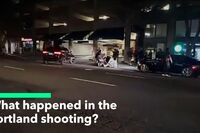Violence Begets Violence in Racial Protests From Oregon to Wisconsin
What You Need To Know
Racial tensions boiled over in Portland, Oregon, and around the world after police in Minneapolis killed a Black man, George Floyd, in May. Demonstrations intensified last week after police in Kenosha, Wisconsin, shot another Black man, Jacob Blake, multiple times at close range on Aug. 23. He is hospitalized and reported to be paralyzed.
Protests since have turned deadly. In Kenosha, a White 17-year-old who attended a Trump rally was accused of shooting three people, two fatally, during a protest. On Saturday in Portland, a man associated with a right-wing group was shot and killed after hundreds of supporters of President Donald Trump clashed with Black Lives Matter protesters.
In a presidential election year, politics is woven into the demonstrations and the backlash. Trump plans to go to Kenosha on Tuesday, over the objection of the state’s Democratic governor, Tony Evers. The governor on Monday ordered legislators to convene a special session on law enforcement reform, but the Republican-controlled legislature could decline to consider bills on the issue.
Nationally, Republican campaign ads have sought to link violence and demonstrations to Democratic opponents. Former Vice President Joe Biden, the Democratic presidential nominee, is addressing the protests and counterprotests as he campaigns.
“I condemn violence of every kind by anyone, whether on the left or the right,” Biden said in a statement Sunday. “And I challenge Donald Trump to do the same.”
Key Coverage
By The Numbers
- 7 Number of times Jacob Blake was shot in the back by police in Kenosha, Wisconsin.
- 63% Percentage of U.S. voters who say they disapprove of President Donald Trump's handling of race relations, according to a Wall Street Journal/NBC News poll. Just 33% approve.
- 15.5% The Black unemployment rate, persistently higher than the country's as a whole. The overall U.S. rate is 11.1%.
Why It Matters
The protests in recent months have highlighted racism throughout American culture, not only in the criminal justice system but also in corporate boardrooms and workforces, in brands like the NFL’s Washington Redskins and Aunt Jemima breakfast foods, and in historical markers like Confederate statues.
Some companies have pledged to make more room on their shelves and in their funding portfolios for Black-owned businesses. California just passed legislation to require corporate boards to include people of color. Famous figures with infamous pasts on race are being re-examined, from slave-owning founding fathers like George Washington and Thomas Jefferson to the British merchants who financed the industrial revolution while profiting from slavery. Cities from Los Angeles to Minneapolis, Atlanta and New York are reconsidering how police departments should be funded.
Protests that began in Minneapolis spread not just across the U.S. but around the world, as people in Britain, France and Australia reckoned with generational issues of inequality.
Effective remedies require debate and disagreement.
Timeline
-
4 years ago Moral Certainty Can’t Fix America’s Race Problem
-
4 years ago While Crime Fell, the Cost of Cops Soared














